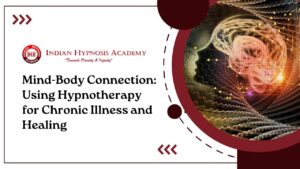Welcome to a fascinating exploration into the realm of hypnosis and its potential in treating mental disorders. Have you ever wondered about the power of the mind and how it can be harnessed for healing? Join us on this journey as we delve into how hypnosis, often shrouded in mystery and misconceptions, is making waves in the world of mental health therapy. Get ready to uncover the truth behind hypnosis and its transformative effects on our well-being.
Understanding Hypnosis
Hypnosis is a state of focused attention and heightened suggestibility, where individuals are more open to positive changes in thoughts, feelings, and behaviors. It involves guiding someone into a trance-like state through relaxation techniques and verbal cues. While in this altered state of consciousness, the mind becomes more receptive to therapeutic suggestions aimed at addressing various mental health issues.
Contrary to popular belief, hypnosis is not about losing control or being manipulated against one’s will. Instead, it is a collaborative process between the individual and the therapist. By tapping into the subconscious mind, hypnosis can help uncover underlying beliefs and emotions that may contribute to mental health challenges.
Understanding hypnosis involves recognizing its potential as a tool for enhancing self-awareness and facilitating personal growth.
How Hypnosis is Used in Therapy
Hypnosis is a powerful tool used in therapy to access the subconscious mind and create positive changes. During a hypnotherapy session, a skilled therapist guides the individual into a state of deep relaxation where they are more receptive to suggestions for change.
Through this heightened state of focus, individuals can explore their thoughts, feelings, and behaviors on a deeper level. This allows them to uncover underlying issues that may be contributing to their mental health struggles.
Hypnosis can be tailored to address specific concerns such as anxiety, phobias, trauma, or even chronic pain. By bypassing the critical conscious mind, hypnotherapy can help reframe negative thought patterns and instill new coping mechanisms.
Therapists use various techniques within hypnosis sessions to promote healing and empowerment. These may include visualization exercises, guided imagery, or direct suggestions aimed at reinforcing desired behaviors.
Hypnosis in therapy offers a unique approach to addressing mental health challenges by tapping into the inner resources of the mind for profound transformation.
Benefits of Hypnosis in Therapy
- Accessing the Subconscious Mind: Through hypnosis, individuals can access their subconscious mind where memories, emotions, and beliefs are stored. This allows for a deeper exploration of underlying issues that may be contributing to mental health struggles.
- Increased Relaxation: Hypnosis induces a state of deep relaxation, reducing stress and promoting a sense of calm. This can help alleviate symptoms of anxiety and depression.
- Identifying and Changing Negative Thought Patterns: By accessing the subconscious mind, individuals can identify negative thought patterns and replace them with more positive and empowering ones.
- Addressing Root Causes: Hypnotherapy allows for a deeper exploration of past experiences and traumas that may be contributing to current difficulties. By addressing these root causes, lasting change can be achieved.
- Empowerment: Hypnosis in therapy empowers individuals by helping them tap into their inner resources and strengths. This can increase self-confidence and resilience.
- Non-invasive Treatment Option: Unlike medication or other forms of therapy, hypnosis is non-invasive and has no side effects. This makes it a safe option for those who may not respond well to traditional treatments or have concerns about taking medication.
- Tailored Approach: Hypnotherapy can be tailored to address specific concerns and goals. This allows for a more personalized approach to treatment, increasing the likelihood of success.
- Complementary to Other Therapies: Hypnosis can be used alongside other forms of therapy, such as cognitive-behavioral therapy (CBT) or psychotherapy, to enhance their effectiveness.
In conclusion, hypnosis is a powerful tool that can be used in therapy to promote healing and transformation. By accessing the subconscious mind and empowering individuals, it offers a unique approach to addressing mental health challenges. If you are considering hypnotherapy, make sure to consult with a trained and licensed therapist who specializes in this technique for the best results.
Benefits of Hypnosis for Mental Health
Hypnosis offers a range of benefits for mental health that can complement traditional therapy approaches.
One significant advantage is its ability to access the subconscious mind, allowing individuals to explore and address underlying issues contributing to their mental health challenges.
Through hypnosis, people can develop coping mechanisms, enhance self-awareness, and promote relaxation, which are essential components of managing conditions like anxiety, phobias, and PTSD.
Moreover, hypnosis can help improve focus and concentration while reducing stress levels, leading to better overall emotional well-being.
By tapping into the power of suggestion during a hypnotic state, individuals may experience positive changes in thought patterns and behaviors that support their mental health goals.
Additionally, hypnosis can be used to address specific mental health concerns directly. For example, it has been shown to be effective in managing symptoms of depression and reducing the frequency and intensity of panic attacks.
Overall, by promoting relaxation, self-discovery, and positive changes in thought patterns and behaviors, hypnosis can be a valuable tool for improving mental health and supporting overall well-being.
Examples of Mental Disorders Treated with Hypnosis
Hypnosis has been shown to be effective in treating a variety of mental disorders. For instance, anxiety disorders like phobias, panic attacks, and generalized anxiety can often be alleviated through hypnotherapy. By accessing the subconscious mind, hypnosis helps individuals confront and reframe their fears.
Moreover, hypnosis is also beneficial for managing stress-related conditions such as insomnia and chronic pain. Through relaxation techniques and positive suggestions during a hypnotic state, individuals can experience relief from physical discomforts associated with these conditions.
Additionally, hypnotherapy has been used to address mood disorders like depression. By guiding patients to explore underlying emotions and beliefs in a safe environment, therapists can help shift negative thought patterns towards more empowering ones.
The versatility of hypnosis in treating various mental health issues highlights its potential as a complementary therapy alongside traditional treatments.
The Science Behind Hypnosis and its Effectiveness
Have you ever wondered how hypnosis actually works in treating mental disorders? Well, let’s delve into the science behind it. Hypnosis involves inducing a relaxed state where the mind is more open to suggestion. During this trance-like state, the brain waves shift into a pattern similar to when we are deeply relaxed or in a meditative state.
Research has shown that hypnosis can influence certain parts of the brain involved in controlling pain perception, emotions, and behavior. By tapping into the subconscious mind through hypnotherapy, therapists can help individuals reframe negative thought patterns and behaviors.
Moreover, neuroimaging studies have revealed changes in brain activity during hypnosis sessions, indicating its potential effectiveness in addressing various mental health conditions. This alternative therapy approach is gaining recognition for its ability to complement traditional treatments and improve overall well-being.
One of the key ways hypnosis works is by bypassing the critical conscious mind and accessing the more suggestible subconscious mind. This allows for changes to be made at a deeper level, where beliefs, emotions, and behaviors are stored.
In addition, hypnosis has been found to activate the parasympathetic nervous system, which is responsible for relaxation and restoration. This can lead to reduced stress levels, improved sleep quality, and a sense of calmness.
Hypnosis also helps individuals tap into their inner resources and strengths. By accessing the subconscious mind, individuals can gain insights and perspectives that they may not have been aware of consciously. This can help them overcome challenges and make positive changes in their lives.
Furthermore, studies have shown that hypnosis can have a direct impact on brain chemistry. During hypnotherapy sessions, there is an increase in the production of neurotransmitters such as serotonin and dopamine, which play a role in regulating mood and behavior.
Overall, hypnosis has been found to be effective in treating various mental health conditions such as anxiety disorders, phobias, addiction, depression, and chronic pain. It also has potential benefits for improving self-esteem, concentration, motivation, and performance.
In conclusion, the science behind hypnosis is still being studied, but research has shown its potential in promoting physical and mental well-being. It is a safe and non-invasive therapy that can be used alongside traditional treatments to address a wide range of issues. If you are considering hypnotherapy, make sure to consult with a qualified and experienced therapist to ensure the best results.
Common Myths and Misconceptions About Hypnosis
There are several common myths and misconceptions surrounding hypnosis that often lead to misunderstandings about its effectiveness in treating mental disorders. One prevalent myth is that hypnosis is a form of mind control, where the hypnotist can make you do things against your will. In reality, hypnosis is a collaborative process between the individual and the therapist, focusing on suggestions for positive changes.
Another misconception is that only gullible or weak-minded individuals can be hypnotized. However, research has shown that most people can enter a hypnotic state with willingness and openness to the process. Additionally, some may believe that under hypnosis, they will reveal their deepest secrets involuntarily; this is not true as individuals always maintain control over what they choose to share during therapy sessions.
Furthermore, there’s a belief that one may get stuck in a hypnotic trance or never wake up from it. In actuality, coming out of a hypnotic state happens naturally at the end of a session or when needed. It’s essential to separate fact from fiction when considering hypnotherapy as an option for mental health treatment.
Conclusion: Harnessing the Power of the Mind for Mental Health Treatment
Harnessing the power of the mind for mental health treatment through hypnosis offers a promising avenue for individuals struggling with various disorders. By tapping into the subconscious and addressing underlying issues, hypnosis can complement traditional therapy methods and provide relief to those in need. While more research is needed to fully understand its mechanisms, the potential benefits of hypnosis in treating mental health conditions are undeniable. Embracing this holistic approach towards healing not only empowers individuals but also underscores the interconnectedness of mind and body in promoting overall well-being. Consider exploring hypnotherapy as part of your mental health journey and unlock the transformative power of your own mind.




